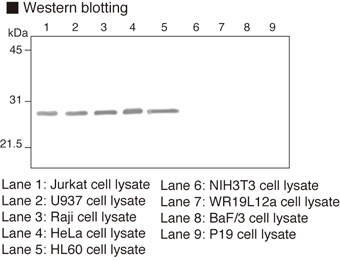Anti-DJ-1 (Human) mAb
| Code | Size | Price |
|---|
| MBL-M043-3 | 100 ug | £323.00 |
Quantity:
Prices exclude any Taxes / VAT
Overview
Host Type: Mouse
Antibody Isotype: IgG1
Antibody Clonality: Monoclonal
Antibody Clone: 3E8
Regulatory Status: RUO
Target Species: Human
Application: Western Blot (WB)
Shipping:
4°C
Storage:
-20°C
Images
Documents
Further Information
Applications:
WB - 1-10 ug/mL (chemiluminescence detection system)
Background:
DJ-1 (PARK7/CAP1/RS) was originally cloned as a putative oncogene capable of transforming NIH/3T3 cells in cooperation with h-ras, a protein expressed in sperm, and a regulator of RNA-protein interactions. DJ-1 has also been isolated as a gene associated with autosomal early-onset Parkinson's disease (PD). Taken together, DJ-1 appears to be involved in diverse biological processes. First, several lines of evidence suggest that DJ-1 plays a role in the oxidative stress response. In cultured mammalian cells, DJ-1 quenches reactive oxygen species and is converted into a variant with a more acidic isoelectric point. Therefore, DJ-1 protects against reactive oxygen species-induced cell death, and its suppression with small interfering RNA (siRNA) sensitizes cells to such insults. Second, DJ-1 modulates transcription through interaction with DJ-1-binding protein as well as with protein inhibitor of activated STAT (PIAS). The latter modulates the activity of various transcription factors. Third, DJ-1 has been recognized as a regulatory subunit of an RNA-binding protein. Fourth, DJ-1, which is structurally related to the molecular chaperone Hsp31, may have chaperone activity itself, preventing heat-induced aggregation of substrate proteins, including α-synuclein. In addition, several lines of evidence suggest that DJ-1 plays a
role in human tumorigenesis. First, breast cancer patients have elevated levels of circulating DJ-1 and anti-DJ-1 autoantibodies compared to healthy and non-breast cancer patients. Secondly, DJ-1 protein is increased in primary non-small cell lung carcinoma samples. Thirdly, treatment of cells from the human lung cancer cell line NCI-H157 with paclitaxel and MEK inhibitor U0126 leads to a decrease in DJ-1 protein expression.
Concentration:
1 mg/mL
Formulation:
100 ug IgG in 100 ul PBS containing 50% glycerol, pH 7.2. Contains nopreservatives.
Gene IDs:
Human: 11315 Mouse: 57320
Immunogen Translated:
Full-length recombinant human DJ-1 (1-187 a.a.)
Reactivity:
This antibody reacts with human DJ-1
(28 kDa) on Western blotting.
Shelf Life:
1 year
Source:
This antibody was purified from mouse ascites
fluid using protein A agarose. This hybridoma was
established by fusion of mouse myeloma cell P3U1 with
Balb/c mouse splenocyte immunized with the recombinant
full-length human DJ-1 (1-187 a.a.).
Target:
DJ-1
References
1) Brandopadhyay, R., et al., Brain 127, 420-430 (2004)
2) Nagakubo D., et al., Biochem. Biophys. Res. Comm. 231,
509-513 (1997)




